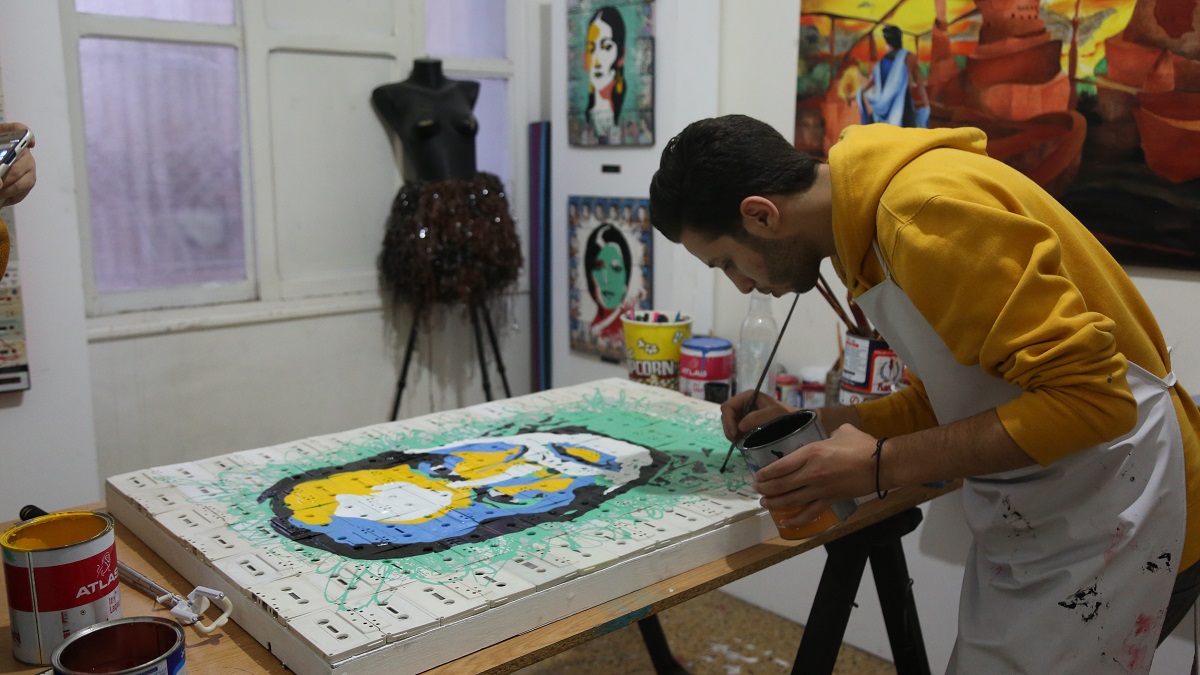Youness Miloudi is an up-and-coming artist from Oujda who has gained attention for his newly released collection, Kassita. Evidence of his craft are neatly organized throughout his fourth-floor home-studio: paintbrushes on the table, an easel with paintings from the collection he is in the process of finishing, and walls lined with pieces from the Kassita collection.
For his first collection, Kassita, Miloudi has repurposed discarded cassette tapes and used them as canvases. Each piece in the collection has 112 cassette tapes, representing 112 different production companies and musicians from all over the world. Painted on the cassette canvases are musicians of all nationalities and backgrounds. Miloudi states that it was vital for him to promote other artists not only for himself but for the observer. «It is the sharing of other artists. And when we share artists, we share cultures».

Miloudi began working on Kassita in 2012. Still, his inspiration for the collection came from his childhood memories of spending time with his uncle in his studio, where he worked with cassette tapes. Miloudi took a break from working on Kassita to attend art school; his childhood dream.
Miloudi fulfilled his dream and attended the Graduate School of Fine Arts Casablanca, specializing in interior and object design work. The most important aspect he learned from his time in school «was not necessarily the studies or the subjects but more the observation of how art develops in Morocco. For me, it was a door to discover this. It allowed me to observe other artists and organizations. Art school opened doors to opportunities».
Kassita and recycling
Since graduating, Miloudi dedicates all of his time to his craft. In 2017, he had his first exhibition in Oujda, his hometown, where he showcased pieces from the Kassita concept, which featured musicians from the region. His second exhibition was in the Morocco Mall in Casablanca for International Women's Day, where he used the Kassita concept to feature women prominent in their respective fields.
When asked why he chose to participate in International Women's Day and portray these influential women as part of the Kassita collection, Miloudi beautifully responded, «it was an opportunity to exhibit in Morocco more and it was in the same period of women's day. Why not work with women?»
When speaking on the message he wants to convey through Kassita, Miloudi says, «this concept is to tell people not to discard these tapes because they are pieces of musical heritage and because it isn't good for the environment. The concept is about the importance of recycling, and when I was working on the concept, I wanted to relate this message to the people and the government».
Indeed, through his collection, Miloudi promotes recycling and representation simultaneously. «The idea is to take the cassettes that have been thrown away and to draw artists on these tapes so we get a portrait of an artist on a medium that will never die».

When questioned if he thinks that art has power, Miloudi sits up and says «yes», in a manner that suggests that the answer should be obvious.
«Art is something that helps me to live a quality life and to think positively and manage my life well and to find solutions to problems. So, I think art is applied to all areas, and all human experiences can be reflected. So, art is a power. Art can give you a door to connect your negative thinking and turn it into something positive. Therefore, through art, the positive and the negative are balanced».
Youness Miloudi is a unique talent who expresses himself and the issues that are important to him through his artwork. His ability and passion are assurances of a promising career filled with impactful art that reflect the human experience, which inevitably connects all human beings to one another.





 chargement...
chargement...













